The narrative of Professor Wacław Felczak's life resembles the plot of a Hollywood blockbuster, filled with courage, steadfastness and heroism. Leading the fearless Tatra couriers, who braved perilous journeys through Hungary to reach occupied territories, Wacław Felczak - the patron of the present-day Felczak Institute, played a pivotal role in shaping the anti-communist Hungarian opposition. Even three decades after his demise, on October 23, 1993, his influence persists, testament to his unwavering commitment to fostering collaboration among the nations of Central Europe. On March 23, 2024, on the day of Polish-Hungarian friendship, a film about Wacław Felczak premiered on Hungarian public television.
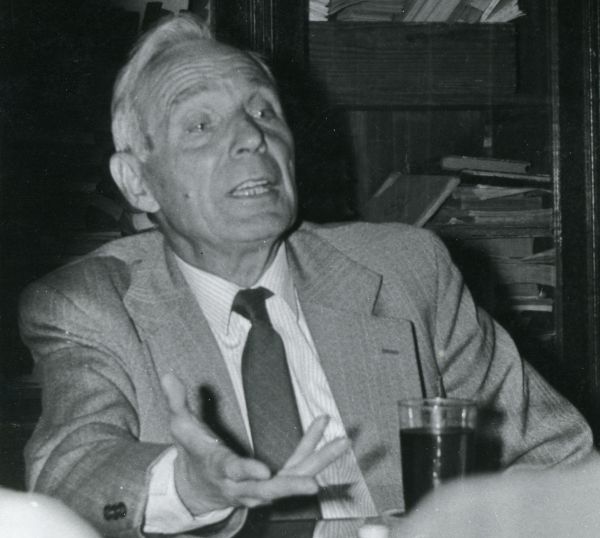
Professor Wacław Felczak in 1989 (photograph: private collection of the professor)
The legendary historian who created history
"Fel-tsak or Fel-tʂak? Thanks to the different pronunciation in Polish and Hungarian, this question was quite common among the Hungarian participants on the Summer University in Krasiczyn, Poland," noted a journalist from the Visegrad Post portal. However, few people in the audience simply wondered who Wacław Felczak was, referring to the annual meeting of young Hungarians and Poles organized annually by the Felczak Institute in Warsaw.
'Wacław Felczak was a talented historian, a specialist in the history of Hungary and Polish-Hungarian relations in the past. However, his scientific career developed in the shadow of public activity resulting from patriotism and readiness to make sacrifices. Felczak became an active actor in historical events several times - first during World War II, then during the period of strengthening Stalinism in Poland, and finally during the fall of communism' - noticed the portal Wszystko co najważniejsze" in an article titled "Wacław Felczak - a historian who created history"
According to historian Elżbieta Orman, as quoted by the portal BritishPoles.uk, this history professor "was surrounded by an aura of heroic legend and mystery and was an expert on the modern history of Hungary and the Slavs in the Austro-Hungarian monarchy.
It is a known fact that, as per usual, at least one third of the students do not turn up, especially if attendance at lectures is not checked. Felczak's lectures were always packed full. The strange thing was that students from faculties other than history also turned up – physics, law... These were lectures on 19th-century history. This is how Artur Janicki, one of his former students, recalled Professor Felczak's lectures in an interview with kurier.plus – a historian, TV personality, outstanding documentary filmmaker, and author of over fifty films, including "The Hero of Poland and Hungary" – about the life and achievements of Professor Felczak.
"In the twilight of communist Poland, a historian from Krakow shaped the views of a large group of people, both Poles and Hungarians. Thirty years have passed since his death, yet they still identify themselves as his students," noted Jacek Taran in the autumn of 2023 in "Tygodnik Powszechny," emphasizing that when his former students hear a question about Wacław Felczak, "they respond similarly, although entirely independently of each other": "He was our moral compass," "An authority," "An example of a man and a historian," and remarkably unanimously, "He shaped us."
"We always addressed Wacław Felczak as professor. When some formalist dared to object occasionally, stating that he did not have the title of professor, only an associate professor, many of us were willing to explain to him that he was not promoted in communist Poland simply because, as an outstanding dissident, he had a remarkable record as a political prisoner and gray hair from the death cell. As you can see, the issue of his title served to recall his merits for the homeland and emphasize the character traits that placed him far above careerists who owed their professorships to obedient service to the communist regime. Professor Felczak's persona had an educational impact on many students," reminisced historian and senator Piotr Boroń, one of Professor's students at Jagiellonian University ('81), on the Kurier.plus portal. "I remember Professor Felczak as a slim man, always in a suit and tie, always impeccably shaved and well-groomed, a spry gentleman with a very pleasant appearance. His gray hair, always elegantly trimmed, was a testament to his heroism and suffering for the sacrifice for Poland," emphasized Piotr Boroń.
The author of many books, including "History of Hungary" and "History of Yugoslavia," attracted crowds of students eager for real historical knowledge and intriguing stories about the Balkans or Hungary. Dr. Andrzej A. Zięba also remembered Professor Felczak not only as a historian but as an "extraordinarily interesting person." "The first and last history teacher encountered during studies who shared with us something more than just erudition. Towards most of the then academic staff of the Institute of History, I felt a cultural alienation. They taught, demanded, were competent, but belonged – that's how I felt – to that world that ruled back then," noted Prof. Andrzej A. Zięba. "He could spend hours weaving fascinating stories... about others, while he himself placed somewhere in the background, even if he was actually the main actor and perpetrator of various events," wrote IPN historian Dr. Wojciech Frazik, a former student of Wacław Felczak, author of the biography titled "Emissary of Free Poland" and a biographical exhibition dedicated to the brave courier from the times of World War II. "'Study history in Poland? In Poland, we create history, not learn about it,' or 'We live in a country where every self-respecting Pole sooner or later ends up in prison. I've already served once; now it's your turn, colleagues' – legendary sayings with which the respected Krakow professor began his lectures were recalled by his student and protégé Prof. Maciej Szymanowski.
Giving hope to the Hungarians and to the Poles
"Even if he was not officially a professor, he became one for a whole generation of Polish–Hungarian oriented youngsters, Csaba Kiss Gy., István Kovács, Áron Petneki and others. Starting from December 1979, together with István Kovács, Felczak organized seminars for ten-something participants. In the framework of these private lectures Felczak was able to spread his vision for the future, giving hope to both nations" - emphasizes the author of the text about Felczak in the Visegrad Post.
Professor Wacław Felczak not only left an indelible mark on successive generations of students at Jagiellonian University but also played a crucial role in inspiring current Hungarian leaders, former anti-communist dissidents, to assume responsibility for their nation. Figures like Viktor Orbán (later becoming the head of the government in Budapest), János Áder (serving as president from 2012-2022), and László Kövér (holding the position of Speaker of the Hungarian Parliament) actively engaged with the wisdom of this heroic Pole. "It's a paradox, but a Pole was the one guiding Hungarians on how to be true to their identity. This was the era of Kádárism, when the spirit of the Hungarian nation seemed broken, and doubts arose about its continued existence. Felczak, however, persuaded his intellectual peers that the nation not only persisted but would endure. Furthermore, he foresaw the imminent collapse of the communist system, insisting that intellectuals would need to shoulder the responsibility for the state. True to his words, history unfolded accordingly," elucidated IPN historian Dr. Wojciech Frazik during the inauguration of the exhibition dedicated to Professor Felczak.
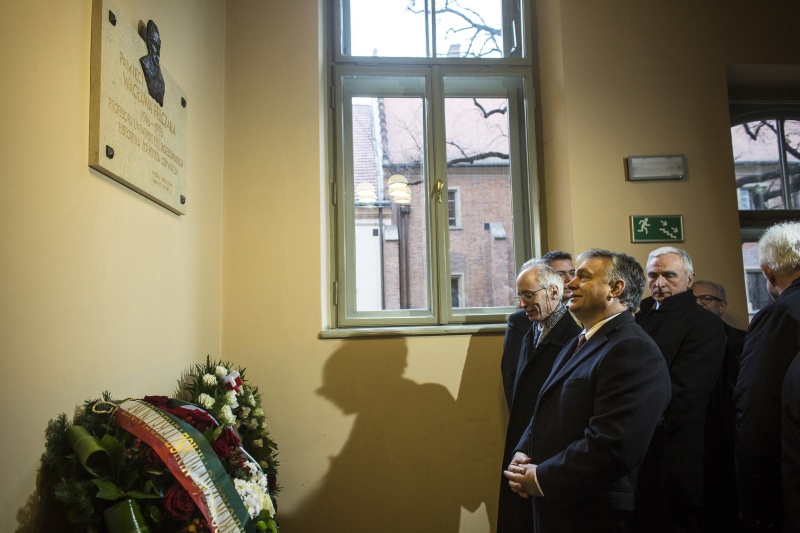
Hungarian Prime Minister Viktor Orbán lays a wreath at the commemorative plaque of Professor Wacław Felczak at the Institute of History, Jagiellonian University, on December 9, 2016. Photo by: MTI/Press Office of the Hungarian Prime Minister/Balázs Szecsődi
He also had a profound impact on the family of the current Ambassador of Hungary to Poland. Renowned specialist in Polish history and translator of Polish literature, Professor István Kovács, met Wacław Felczak in Krakow in 1972. The scholars became such close friends that Professor Felczak became the godfather to the later Ambassador of Hungary in Warsaw. "My parents always referred to him as 'Wacuś.' We spent several Christmases together. If he couldn't be with us at that time, he would come for two weeks in the summer. We also visited his apartment in Krakow. As a child, I remember that he had many books at home. Wacław Felczak was the first Pole I ever met. The second was St. John Paul II, with whom I spoke in Stary Sącz during the canonization of Blessed Kinga in 1999. The Pope said then that for a foreigner, knowledge of the Hungarian language is halfway to heaven. Wacław Felczak knew our language very well. I think that now, not only because he knew Hungarian but also because of his righteous life, he is already in heaven. He was a very ideological person. Today, through the prism of Wacław Felczak, I perceive Poles as well," recalled Orsolya Zsuzsanna Kovács in an interview with the magazine "Do Rzeczy."
Patriotic upbringing
Jan Wacław Felczak was nearly a contemporary of independent Poland. Born on May 29, 1916, in the still-enslaved country in Golbice near Łęczyca, he was the youngest, eighth child in the family of Antoni and Michalina née Pałczyńska. His mother came from a impoverished noble family, many of whose male ancestors were exiled to Siberia for their participation in the November and January Uprisings. Patriotic upbringing combined with coming of age in a country that had just regained independence shaped the character of young Wacław Felczak. He studied history at the University of Poznań, where he became interested in the history of Polish-Hungarian relations and formed a student Circle of Friends of Hungary. His master's thesis was on Władysław Bentkowski, a participant in Polish uprisings of 1831 and 1863, as well as the Hungarian uprising of 1849. Wacław Felczak quickly mastered the Hungarian language and went on a scholarship to Budapest, from where he sent political correspondences to "Dziennik Bydgoski" and "Kurier Poznański." In these writings, he sharply criticized Hungary's collaboration with Nazi Germany. The outbreak of World War II prevented him from completing his doctorate under the supervision of the president of the Hungarian Academy of Sciences, Prof. Imre Lukinich. Wacław Felczak quickly engaged in the activities of the Polish Underground State.
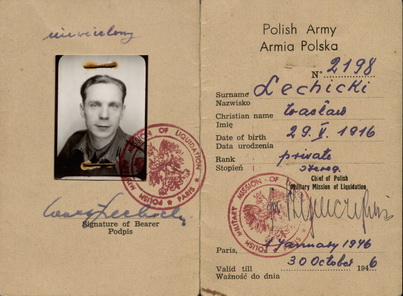
"Lech" More Intriguing than "James Bond"
During most of the Second World War, the young Polish patriot spent his time in Hungary. He played a crucial role in establishing Station "W," facilitating communication between the emigrant Polish government in London and the Polish underground in Warsaw. Wacław Felczak (code name "Lech") and his couriers risked their lives to transfer money, encrypted mail, reports, underground press, and also conducted Polish citizens to Hungary who wanted to join the Polish Army in the West or were important figures in the Underground State.
It wasn't always possible to deceive the enemy. Zofia Marusarz and Stefania Kula, part of the "communication relay," paid the highest price for their dedication to the homeland: they were captured by the Gestapo and executed. Felczak himself was detained several times, but he managed to regain his freedom. For his heroic activities during the war, he was awarded the Virtuti Militari Cross, 5th class.
In March 1944, when German forces entered Hungary, Station "W" had to cease its operations. However, Felczak, who had long been on the German counterintelligence's radar, managed to effectively hide from the Gestapo.
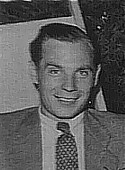
Wacław Felczak in 1946. Photo: public domain
In 1946, at the Sorbonne in Paris, he began writing his doctoral thesis. Simultaneously, he continued to serve as a courier between London, Paris, and Warsaw. He used the pseudonym Vaclav Kaztur or Wacław Lechicki, and he submitted reports on the situation in the Soviet-occupied country directly to Prime Minister Tomasz Arciszewski. In December 1948, he was captured by a patrol in Czechoslovakia. This time, the attempt to escape failed, and the legendary courier was apprehended by the officers of the Security Office. During the two-year investigation, elaborate tortures were attempted to force him to admit to espionage for Western powers. In a staged trial, Wacław Felczak received a life sentence.
Doctorate. For the third time...
After his release from prison at the age of 42, he decided once again to dedicate himself to an academic career. For the third time, he started writing his doctoral thesis. "He was a perpetual doctoral student because history, with a capital 'H,' several times presented him with tasks more important and more difficult than academic work," noted Prof. Maciej Szymanowski. On June 22, 1962, he defended his doctoral dissertation titled "Hungarian National Policy before the Outbreak of the 1848 Uprising." As a scholar, he became associated with the Jagiellonian University. He obtained his habilitation in December 1968. In the second half of the 1980s, he also gave guest lectures in Budapest. His "History of Hungary" gained excellent reviews across the Danube as a work written "with a Hungarian heart and a Slavic soul."
He passed away on the anniversary of the outbreak of the anti-communist uprising in Budapest: October 23, 1993. He is buried at the Cemetery of the Meritorious on Pęksowy Brzyzek in Zakopane. During the funeral speech, his former subordinate and renowned ski jumper Stanisław Marusarz died of a heart attack. Ambassador of Hungary to Poland Ákos Engelmayer also paid tribute, and a wreath on the grave of the heroic Pole was placed by Zsolt Németh (currently the chairman of the foreign affairs committee in the Hungarian parliament) on behalf of the Youth Democratic Union (Fidesz).
Trailer for the film about Wacław Felczak, directed by Grzegorz Kubaszko. Source: YouTube
Not only a film remains after him
The life of the heroic courier and principled historian is a ready-made script for a movie. The first one has already been made. On October 23, 2023, the documentary film titled "Kurierskim szlakiem. Azymut Węgry," directed by Grzegorz Kubaszka, premiered. Wojciech Skibiński and Mateusz Kurcius played the role of Wacław Felczak. For the past five years, the Wacław Felczak Institute of Polish-Hungarian Cooperation has also been in operation. As the director of the institute, Prof. Maciej Szymanowski, pointed out, "in this way, his unwavering conviction about the need for the best education and the use of the talents of young people is embodied, about the necessity of supporting their development and careers also in an institutional way, about the great importance of Polish-Hungarian sympathy and friendship that Poles and Hungarians should cultivate but also share this gift with other nations."
The film about Felczak was translated into Hungarian and the voices of famous Hungarian actors were used for dubbing. On March 23, 2024, on the day of Polish-Hungarian friendship, a film about Wacław Felczak premiered on Hungarian public television. Before its television premiere, the film was already shown in Budapest. How did Hungarians receive this document? - Certainly very lively and very emotional. They liked it very much - said the film's director Grzegorz Kubaszko in the "Rozmowa Dzień" program on TVP3 Opole.
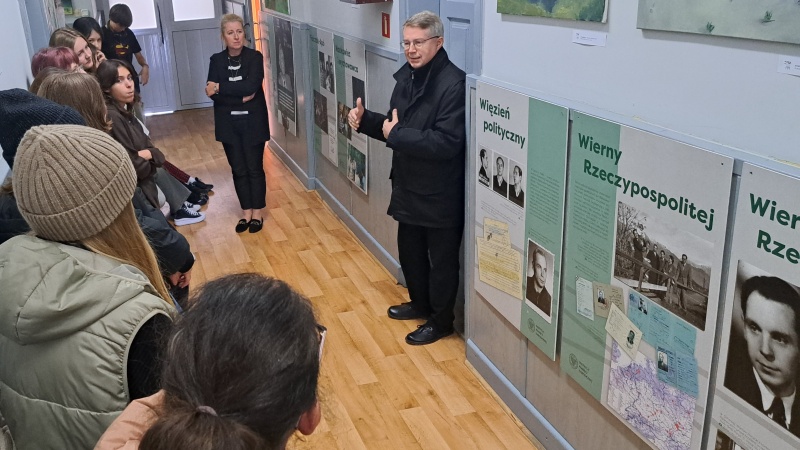
The figure of Professor Felczak was presented to the students by the historian from the Institute of National Remembrance (IPN). Dr. Wojciech Frazik, being the author of a biographical exhibition dedicated to the brave courier from the era of World War II, shared details about Felczak's contributions, experiences and the historical context in which he played a significant role. Photo by AB
On October 23, 2023, precisely on the thirtieth anniversary of the death of Wacław Felczak, in Zakopane, students from three Krakow high schools, along with their peers from the State School of Fine Arts named after A. Kenar, where the Felczak Institute organizes and finances the learning of the Hungarian language, participated in an unusual history lesson. The figure of Professor Felczak was presented to the students by Dr. Wojciech Frazik, the author of a biographical exhibition dedicated to the brave courier from the times of World War II.
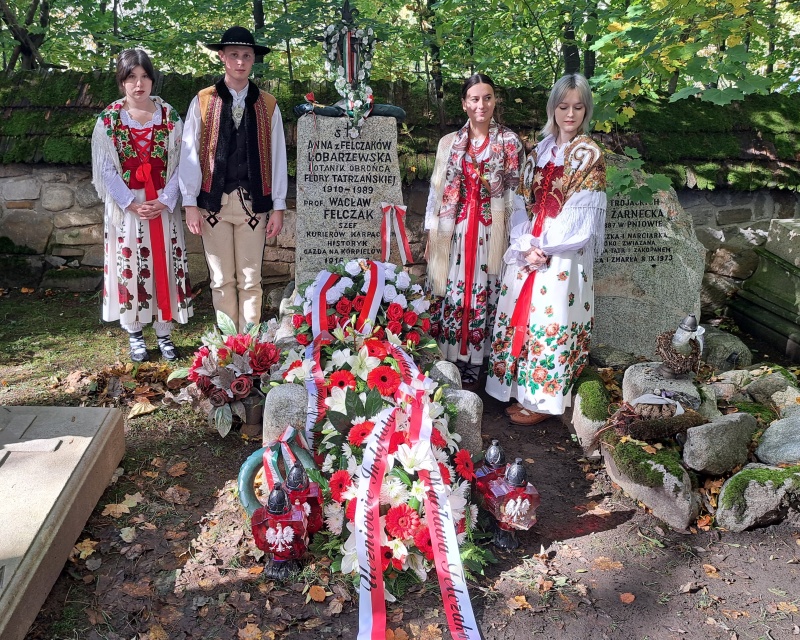
The grave of Wacław Felczak. Photo by AB
After the history lesson, at the cemetery on Pęksowy Brzysk, students, Dr. Wojciech Frazik, and the deputy director of the Felczak Institute, Agnieszka Barátka, laid wreaths on the grave of Professor Wacław Felczak. The day before, at the Cemetery of the Distinguished on Pęksowy Brzyzk in Zakopane, participants of the Friendship Rally in honor of Prof. Wacław Felczak paid tribute to the patron of the Polish-Hungarian Cooperation Institute.
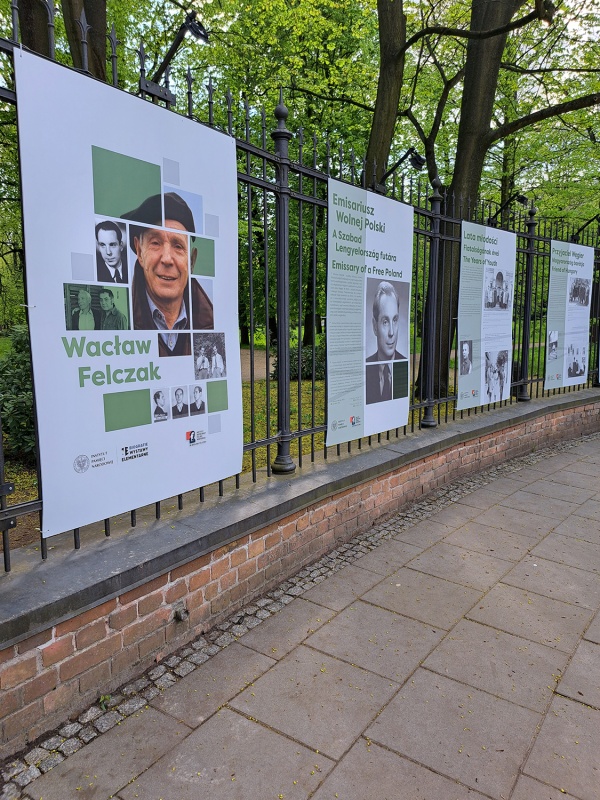
Photo by SZD
Earlier, on May 30, 2023, in the most beautiful park in Warsaw, the Łazienki Królewskie (Royal Baths) in the city center, the Felczak Institute organized a trilingual exhibition. The exhibition, held in a readily understandable manner on panels, showcased the career of Wacław Felczak.
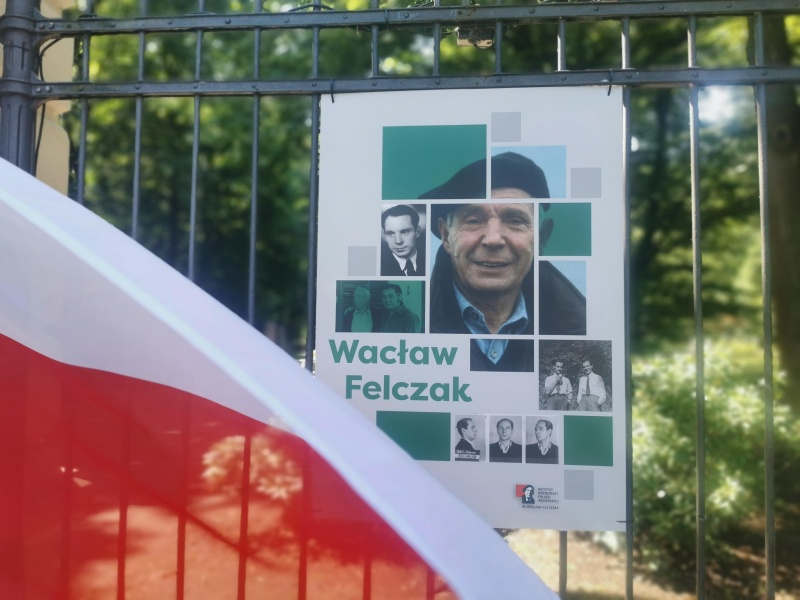
The exhibition about Wacław Felczak. Photo by JAP
The Objectives of the Wacław Felczak Institute:
The aims of the Wacław Felczak Polish-Hungarian Cooperation Institute include, in particular:
- cultivation of Polish-Hungarian traditions and heritage as well as their advancement in public and international life;
- advocation of language acquisition, learning about the culture of the two countries and Polish-Hungarian youth cooperation;
- development of scientific, educational, cultural, economic and sports cooperation between Hungary and Poland;
- initiation and support of initiatives and projects aimed at increasing the familiarity between the two nations;
- support of activities to improve the innovativeness and competitiveness of Poland and Hungary.
Pursuant to the Act of 8 February 2018, the Institute’s bodies are: the International Council of the Institute, the Board of the Institute and the Director.
The International Council of the Institute comprises no more than 20 members, appointed from among those who have distinguished themselves with their knowledge of Polish-Hungarian relations and who have contributed to the strengthening of this cooperation.
The Board of the Institute consists of specialists whose knowledge, expertise or authority guarantee the correct performance of the Institute’s objectives.
The Prime Minister of Poland, with the decision of 1 August 2018, appointed Professor Maciej Szymanowski, PhD as the Director of the Institute.
